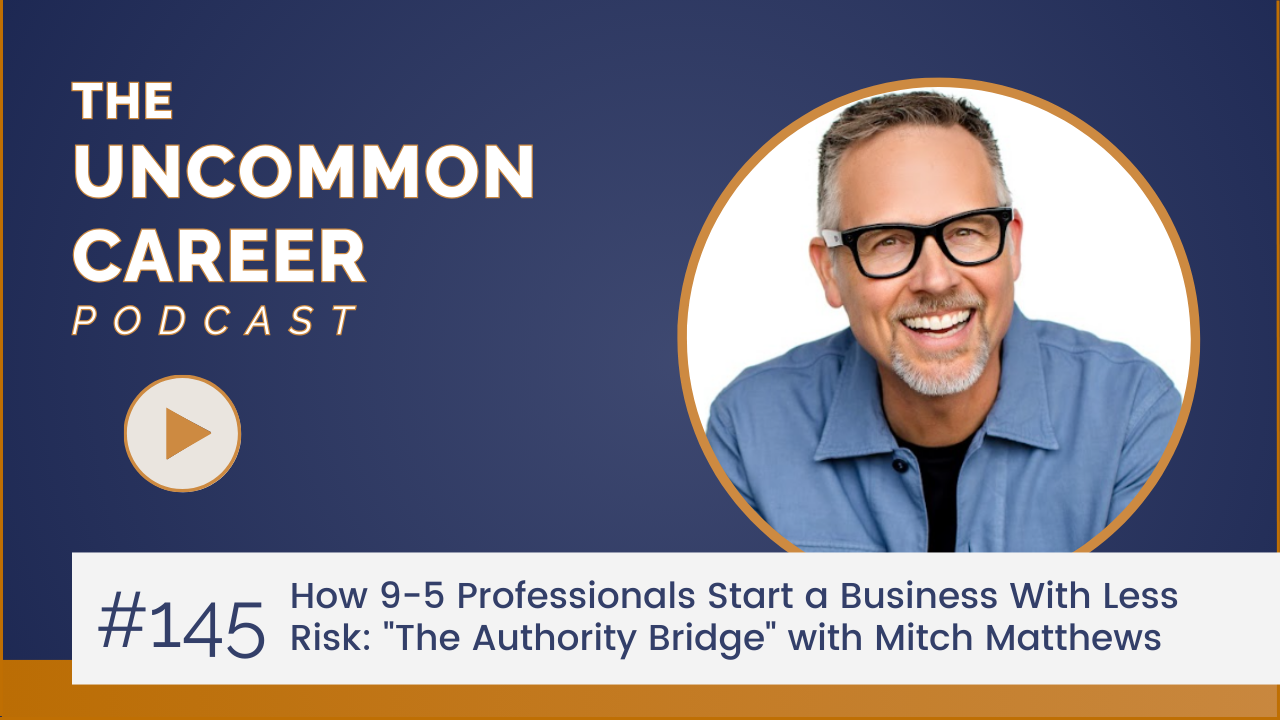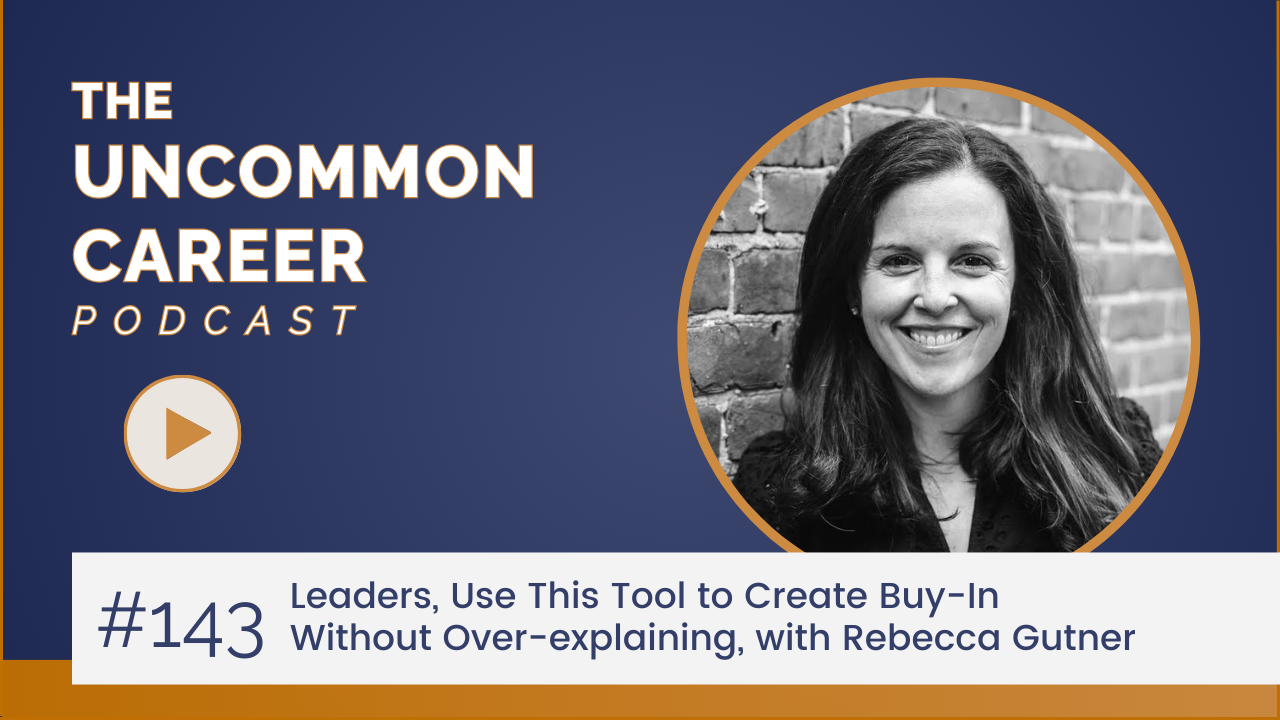72. How only two words can position you to get hired
Aug 13, 2024
Are you tired of leaders and employers assuming they know what you do?
Let's get into the process of repositioning yourself as an industry expert, so that leaders and employers don't look past your experience assuming they know what you do. You'll be able to start from self-reflection and work through the process, culminating in a powerful two-word brand and a few short statements.
We'll talk about:
-
Finding your niche
-
Creating a unique professional title that garners curiosity
-
Incorporating it into your career brand materials
Connect with me:
-
Connect with me on LinkedIn: https://linkedin.com/in/pmortega
-
Get started with your career move: Download The Career Transition Checklist
CLICK HERE FOR FULL TRANSCRIPT
72. How only two words can position you to get hired
PATRICIA:
As you do that, you start to find your thing, your niche, your it factor. Hey friends, welcome back. Are you ever at an event and then you find this great contact at this company that you'd love to work for and you approach them, start talking to them, and finally they ask you, well, what do you do? And you think, this is my chance. Now I can go in and tell them I'm a sales director and they're going to want to talk to me and eventually I'll get interviewed, I'll get hired, and we will all live happily ever after. But instead you say, I'm a sales director. And then instantly you see their eyes glaze over or worse, they give you the, oh, that's nice. And you can tell they have mentally moved on. Well, this happens all the time. And believe it or not, there's something you can do to interrupt that thinking process in their mind. And it is very simple and it's very straightforward. I know there's often these manipulative tips and tricks to gain influence and help people make help, quote unquote, people make decisions that you want them to make. But that's not what I'm talking about here. I'm talking about preparing and being strategic in how you present yourself in a way that eliminates this automatic categorization of who you are and what you do. Okay, so to do this, we actually need to back up. We're gonna go to the very, very beginning, right? So before you start looking for jobs, before you start working on your resume, and if you're an eternal career searcher, like we always advocate for, then this is even before you know that you need to be searching for a position. In this preparation process, what we're working on is figuring out a self-given title that people can't make assumptions about. But in order to do that, we then need to back up a little bit more and reflect on who we are, where we want to go, what professional roles that includes. And once we know that professional role, then it's figuring out what is the combination of skills and experience and education that I have and how do I work? How is it different from the way that other professionals in this same field work? Do I have a different style, a different method, a combination of skills that maybe, you know, other folks in my area don't have? So to figure this out, we have to go out and have conversations with people that have believed in us, that have supported us, that have opened doors for us, because there's a reason why they did that. And so as you do that, you start to find your thing, your niche, your it factor, your, you know, the piece that moves your career forward and the way that it happens for you is going to be different than how it happens for other people. So you want to do the research to figure out what exactly that is. Once you have that, then you start working on some of your branding materials, your career story. And in all honesty, you probably should start with your career story first, because it's going to feel a little bit vague, a little bit nebulous, a little bit abstract. And once you get that career story down, then we pull the best details from that career story to fill in the highlights for your resume. Once you're done working with your branding, now we're getting into a few of your branding statements, which are sort of a, what would we call this? This would be like a culmination of your career materials. They culminate in a few branding statements, some of which you'll use in your LinkedIn profile or the summary of your resume or in your networking conversations. So now we've dwindled down to just a few statements. Now from those statements, you get even more clarity by bringing it down to just a few words. Those few words. with a little bit of a creative spin that matches your personality is your self-given title. So this is how we come up with this title that is going to interrupt that executive or that leader's sales, that leader's process, a thinking process, so that when you say that you are a sales director, they glaze over. But now if they ask you, hey, what do you do? And you say, I hack sales strategies. They're going to ask you a little bit more just for the sheer curiosity that that title you just gave interrupted their cycle of instantly categorizing things. Now, ideally your title will be just a little bit more vague, but still something that reflects your strength, a style or a rare combination of skills, maybe a method or a series of methods. There's an entire system to this. It's actually part of, I think it's Matthew Pollard's system. Let me pause here. I'm going to bring the book and tell you exactly what it is. There we are. It is called The Introvert's Edge to Networking, and the subtitle is Work the Room, Leverage Social Media, and Develop Powerful Conversations. So this is a book by Matthew Pollard, and it looks like Derek Lewis also contributed to it. It's a great book. This is where I got this particular idea, and I've been working with storytelling for quite a while now. an entire branding strategist course for some of the largest brands, and I'm integrating that into storytelling for professional branding. And it's worked wonders for just not only the message that gets sent out and how we're able to communicate our strengths as professionals, but also in giving us and my clients confidence in how they share their experience. It's actually a really cool process. But that particular title piece, how to change from a commodity to a specialist and an expert in your own area, that idea of the title actually came from The Introvert's Edge. So if you want to read it, it's a great book. But if not, this episode gives you just a little taste of that strategy. Okay, so now that we've gotten this piece of how to reposition ourselves as a career expert, what do you do now? Here's some action steps for you. Number one, don't touch your resume, at least not yet. The first thing you want to do is sit down, take a breather, relax, think about what you really want, figure out what position is going to get you there. And there's a whole other conversation we can have around that when it comes to, you know, sometimes the thing that we want is, quote unquote, our passion was our passion. And it seems so elusive. And that's actually not the way to find a really satisfying career. So when I say think about what you want, I mean, think about the skill sets you already have, the strengths and qualities and natural tendencies, the pieces that just come so easily to you that it's just it's almost obvious once we take away that pressure of finding our quote-unquote passion and You know what naturally drives us once we take that pressure away It becomes actually quite clear what we're meant to do or what we can really enjoy and thrive in So take some time reflect figure out what that is and then look forward and think okay What are the positions in which I can accomplish these things or in which I can do this type of work? Once you find that, then look at your career history and start to think about how do I do things differently? What are the skill sets? What do I bring from my career history that is unique going into this new position? And that's a really good starting point. So that's your action item for today. Know that as you go from that all the way through into that title, there is a process. So you want to give yourself some time to go through that process. And if you at any point want to And if you at any point want to, you know, get into coaching or do this together or have some guidance on it, by all means, my link is in the description. Go ahead and schedule a consultation. We'll chat more about it. And if you think we're a good fit, we'll go ahead and move forward. I do also want to let you know that even if you, for whatever reason, can't afford coaching. You don't have time for coaching. Know that this is going to take some time. So even if you're not looking for a job right now, you're not trying to transition right now. You do want to start working on this process. This is part of being an eternal career candidate. And this is you always being ready for the opportunities that come before you. All right. That's all for today. I hope you have an awesome day. Know that we love you. We're praying for you and we'll see you on the next one. Hey, thanks for listening. I really appreciate you spending time with me today. If you found this episode helpful, please tap the five-star review on the show's homepage in your podcast app. It would absolutely make my day, and it helps others discover the Uncommon Career podcast. Now, to download your free career resources and learn how I help seasoned professionals land amazing offers in as little as 90 days, click on the link in the description or go to theuncommoncareer.com. Thanks again, and I'll see you on the next one.
*












